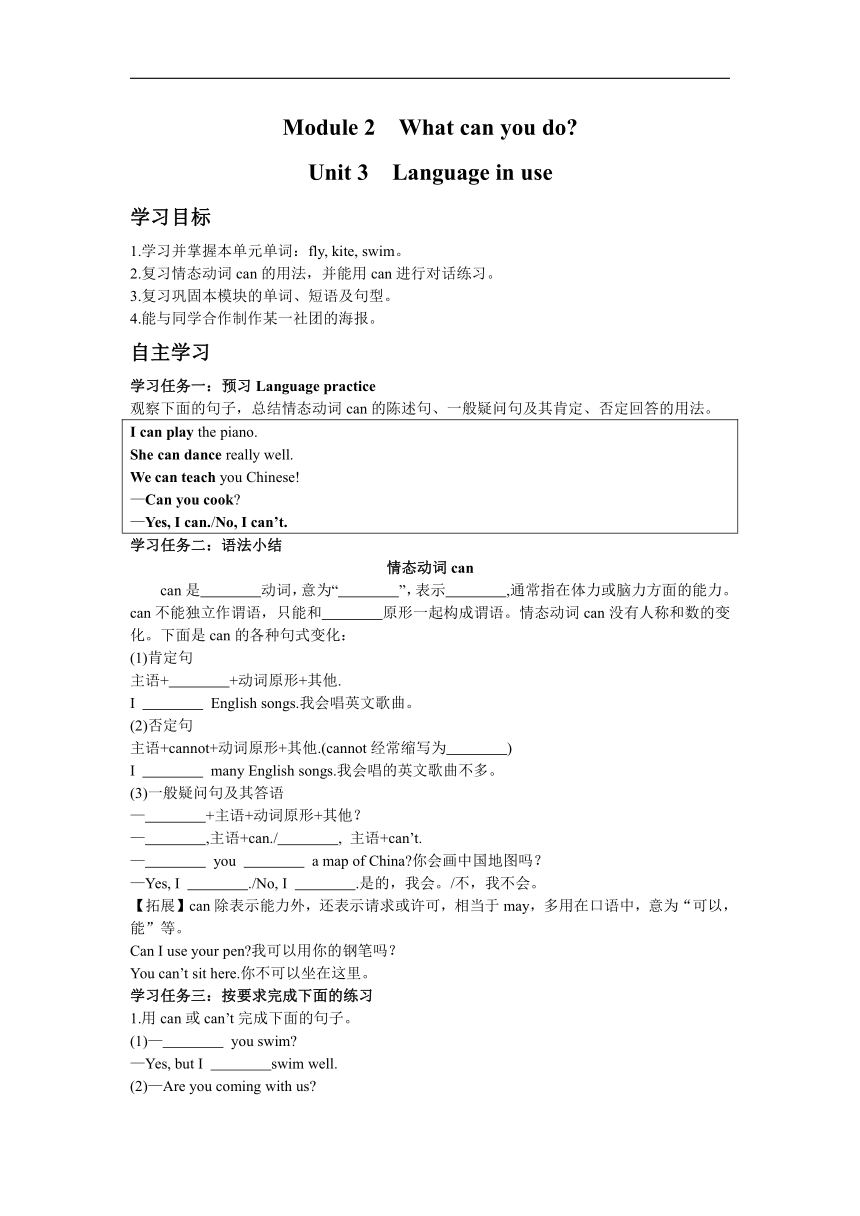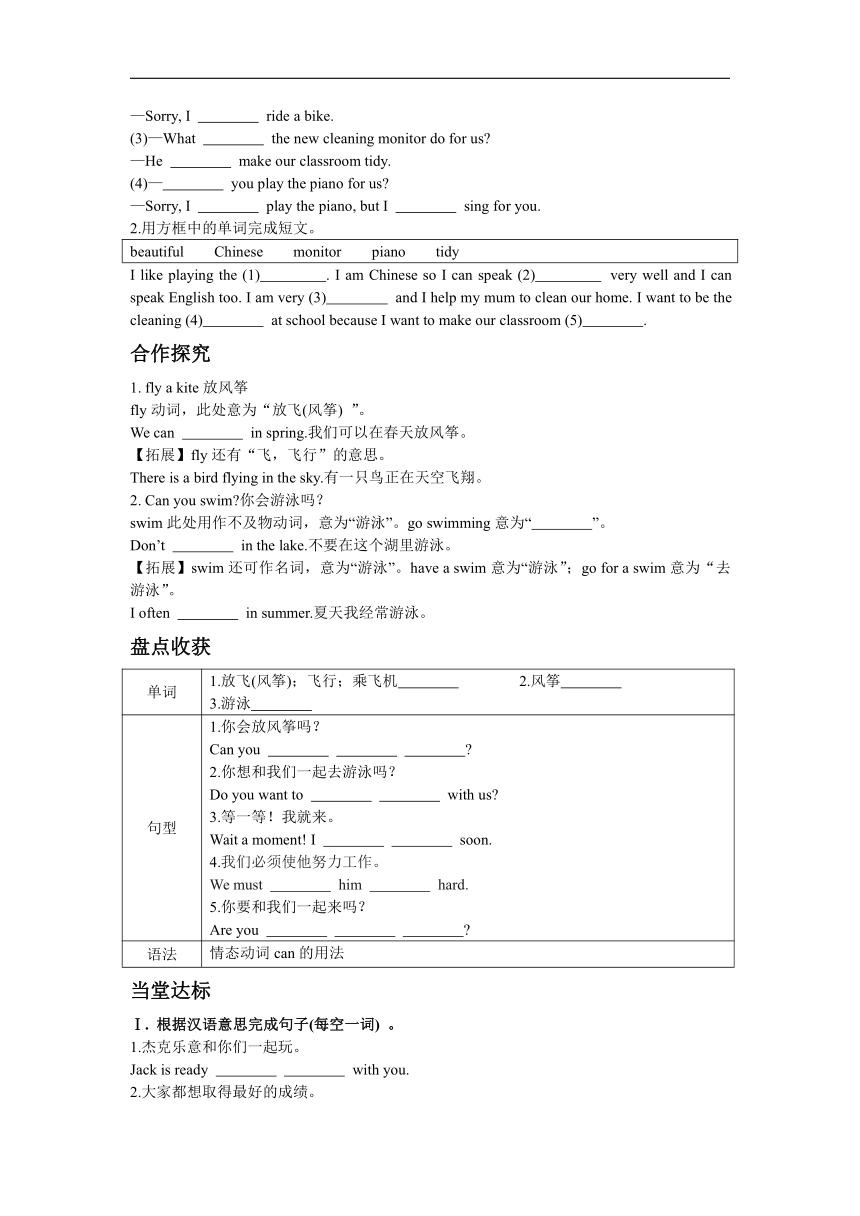Module 2 Unit 3同步学案-外语教研版中学英语七年级下
文档属性
| 名称 | Module 2 Unit 3同步学案-外语教研版中学英语七年级下 |  | |
| 格式 | docx | ||
| 文件大小 | 45.3KB | ||
| 资源类型 | 试卷 | ||
| 版本资源 | 外研版 | ||
| 科目 | 英语 | ||
| 更新时间 | 2024-02-21 19:17:34 | ||
图片预览


文档简介
Module 2 What can you do
Unit 3 Language in use
学习目标
1.学习并掌握本单元单词:fly, kite, swim。
2.复习情态动词can的用法,并能用can进行对话练习。
3.复习巩固本模块的单词、短语及句型。
4.能与同学合作制作某一社团的海报。
自主学习
学习任务一:预习Language practice
观察下面的句子,总结情态动词can的陈述句、一般疑问句及其肯定、否定回答的用法。
I can play the piano. She can dance really well. We can teach you Chinese! —Can you cook —Yes, I can./No, I can’t.
学习任务二:语法小结
情态动词can
can是 动词,意为“ ”,表示 ,通常指在体力或脑力方面的能力。can不能独立作谓语,只能和 原形一起构成谓语。情态动词can没有人称和数的变化。下面是can的各种句式变化:
(1)肯定句
主语+ +动词原形+其他.
I English songs.我会唱英文歌曲。
(2)否定句
主语+cannot+动词原形+其他.(cannot经常缩写为 )
I many English songs.我会唱的英文歌曲不多。
(3)一般疑问句及其答语
— +主语+动词原形+其他?
— ,主语+can./ , 主语+can’t.
— you a map of China 你会画中国地图吗?
—Yes, I ./No, I .是的,我会。/不,我不会。
【拓展】can除表示能力外,还表示请求或许可,相当于may,多用在口语中,意为“可以,能”等。
Can I use your pen 我可以用你的钢笔吗?
You can’t sit here.你不可以坐在这里。
学习任务三:按要求完成下面的练习
1.用can或can’t完成下面的句子。
(1)— you swim
—Yes, but I swim well.
(2)—Are you coming with us
—Sorry, I ride a bike.
(3)—What the new cleaning monitor do for us
—He make our classroom tidy.
(4)— you play the piano for us
—Sorry, I play the piano, but I sing for you.
2.用方框中的单词完成短文。
beautiful Chinese monitor piano tidy
I like playing the (1) . I am Chinese so I can speak (2) very well and I can speak English too. I am very (3) and I help my mum to clean our home. I want to be the cleaning (4) at school because I want to make our classroom (5) .
合作探究
1. fly a kite放风筝
fly动词,此处意为“放飞(风筝) ”。
We can in spring.我们可以在春天放风筝。
【拓展】fly还有“飞,飞行”的意思。
There is a bird flying in the sky.有一只鸟正在天空飞翔。
2. Can you swim 你会游泳吗?
swim此处用作不及物动词,意为“游泳”。go swimming意为“ ”。
Don’t in the lake.不要在这个湖里游泳。
【拓展】swim还可作名词,意为“游泳”。have a swim意为“游泳”;go for a swim意为“去游泳”。
I often in summer.夏天我经常游泳。
盘点收获
单词 1.放飞(风筝);飞行;乘飞机 2.风筝 3.游泳
句型 1.你会放风筝吗? Can you 2.你想和我们一起去游泳吗? Do you want to with us 3.等一等!我就来。 Wait a moment! I soon. 4.我们必须使他努力工作。 We must him hard. 5.你要和我们一起来吗? Are you
语法 情态动词can的用法
当堂达标
Ⅰ. 根据汉语意思完成句子(每空一词) 。
1.杰克乐意和你们一起玩。
Jack is ready with you.
2.大家都想取得最好的成绩。
Everyone wants to get the .
3.我哥哥喜欢踢足球,他在校队。
My brother likes and he is in the .
4.我跳舞跳得好,所以我想加入舞蹈俱乐部。
I can , I’d like the Dance Club.
5.我选择英语俱乐部,因为我不擅长英语。
I the English Club I am not English.
Ⅱ. 句型转换(每空一词) 。
1. Kate can ride a bike.(改为一般疑问句)
Kate a bike
2. Kevin can play tennis. (改为否定句)
Kevin tennis.
3. Jenny wants to join the Food and Drink Club. (改为同义句)
Jenny to join the Food and Drink Club.
4. I can sing English songs. (对画线部分提问)
you
5. Can Tony play the piano (作出肯定回答)
, he .
Ⅲ. 完形填空。
A: I want some students for the school concert. 1 can you do, Bill Can you sing
B: 2 , I can’t. But I can play the 3 .
A: You can do it! Good! How 4 you, Jennifer
C: I can 5 , and I can play the drums, too.
A: Great, Jennifer. You must be a very good singer. Do you know 6 can play the 7
C: Well, I 8 Victor can play the piano.
A: Victor, 9 you play the piano
D: Yeah, I 10 sing or dance, but I can play the piano well.
1. A. Which B. What C. Where D. When
2. A. Not B. Yes C. Sorry D. OK
3. A. basketball B. guitar C. tennis D. chess(国际象棋)
4. A. about B. do C. are D. can
5. A. to act B. act C. sing D. to sing
6. A. what B. who C. where D. why
7. A. guitar B. piano C. drums D. violin
8. A. wants B. knows C. think D. see
9. A. can B. does C. are D. would
10. A. can B. can’t C. doesn’t D. do
学后反思
____________________________________________________________________________________________________________________________________________________________________________________________________________________________________________________________________________________________________________________________
当堂达标参考答案:
Ⅰ. 1. to play 2. best score 3. playing football, school team 4. dance well, so, to join
5. choose, because, good at
Ⅱ. 1. Can, ride 2. can’t play 3. would like 4. What can, do 5. Yes, can
Ⅲ. 语篇解读:本文是围绕为学校音乐会寻找表演人员而展开的对话。
1. B 由下句句意“你会唱歌吗?”可知,本句意为“比尔,你会做什么?”,所以疑问词用what。
2. C 由空格后的I can’t可知,此处选C。
3. B play后面接球类和棋类名词时,名词前不加冠词,空格前有定冠词the,所以排除A、C、D三项;“play the+乐器名词”表示“演奏某种乐器”。
4. A How about... 意为“……呢?”,可用来承上询问对方的情况。本句意为“珍妮弗,你呢?”。
5. C 情态动词后面跟动词原形,所以排除A、D两项;act意为“表演”,sing意为“唱歌”。由下文中的“You must be a very good singer.”可知珍妮弗会唱歌,故选C。
6. B 由下文回答中的Victor can play the piano可知,问话人是在找一个会弹钢琴的人,因此选who,意为“谁”。
7. B 由下文回答中的Victor can play the piano可知,问话人是在找一个会弹钢琴的人,因此选B。
8. C 主语是I,所以排除A、B两项;动词see意为“看到”,不符合语境,所以排除D,选C。
9. A 本句在询问维克托会不会弹钢琴,所以选情态动词can。
10. B 由连词but表转折可知,该空格处与后文can表达的意思相反,所以选can’t。
Unit 3 Language in use
学习目标
1.学习并掌握本单元单词:fly, kite, swim。
2.复习情态动词can的用法,并能用can进行对话练习。
3.复习巩固本模块的单词、短语及句型。
4.能与同学合作制作某一社团的海报。
自主学习
学习任务一:预习Language practice
观察下面的句子,总结情态动词can的陈述句、一般疑问句及其肯定、否定回答的用法。
I can play the piano. She can dance really well. We can teach you Chinese! —Can you cook —Yes, I can./No, I can’t.
学习任务二:语法小结
情态动词can
can是 动词,意为“ ”,表示 ,通常指在体力或脑力方面的能力。can不能独立作谓语,只能和 原形一起构成谓语。情态动词can没有人称和数的变化。下面是can的各种句式变化:
(1)肯定句
主语+ +动词原形+其他.
I English songs.我会唱英文歌曲。
(2)否定句
主语+cannot+动词原形+其他.(cannot经常缩写为 )
I many English songs.我会唱的英文歌曲不多。
(3)一般疑问句及其答语
— +主语+动词原形+其他?
— ,主语+can./ , 主语+can’t.
— you a map of China 你会画中国地图吗?
—Yes, I ./No, I .是的,我会。/不,我不会。
【拓展】can除表示能力外,还表示请求或许可,相当于may,多用在口语中,意为“可以,能”等。
Can I use your pen 我可以用你的钢笔吗?
You can’t sit here.你不可以坐在这里。
学习任务三:按要求完成下面的练习
1.用can或can’t完成下面的句子。
(1)— you swim
—Yes, but I swim well.
(2)—Are you coming with us
—Sorry, I ride a bike.
(3)—What the new cleaning monitor do for us
—He make our classroom tidy.
(4)— you play the piano for us
—Sorry, I play the piano, but I sing for you.
2.用方框中的单词完成短文。
beautiful Chinese monitor piano tidy
I like playing the (1) . I am Chinese so I can speak (2) very well and I can speak English too. I am very (3) and I help my mum to clean our home. I want to be the cleaning (4) at school because I want to make our classroom (5) .
合作探究
1. fly a kite放风筝
fly动词,此处意为“放飞(风筝) ”。
We can in spring.我们可以在春天放风筝。
【拓展】fly还有“飞,飞行”的意思。
There is a bird flying in the sky.有一只鸟正在天空飞翔。
2. Can you swim 你会游泳吗?
swim此处用作不及物动词,意为“游泳”。go swimming意为“ ”。
Don’t in the lake.不要在这个湖里游泳。
【拓展】swim还可作名词,意为“游泳”。have a swim意为“游泳”;go for a swim意为“去游泳”。
I often in summer.夏天我经常游泳。
盘点收获
单词 1.放飞(风筝);飞行;乘飞机 2.风筝 3.游泳
句型 1.你会放风筝吗? Can you 2.你想和我们一起去游泳吗? Do you want to with us 3.等一等!我就来。 Wait a moment! I soon. 4.我们必须使他努力工作。 We must him hard. 5.你要和我们一起来吗? Are you
语法 情态动词can的用法
当堂达标
Ⅰ. 根据汉语意思完成句子(每空一词) 。
1.杰克乐意和你们一起玩。
Jack is ready with you.
2.大家都想取得最好的成绩。
Everyone wants to get the .
3.我哥哥喜欢踢足球,他在校队。
My brother likes and he is in the .
4.我跳舞跳得好,所以我想加入舞蹈俱乐部。
I can , I’d like the Dance Club.
5.我选择英语俱乐部,因为我不擅长英语。
I the English Club I am not English.
Ⅱ. 句型转换(每空一词) 。
1. Kate can ride a bike.(改为一般疑问句)
Kate a bike
2. Kevin can play tennis. (改为否定句)
Kevin tennis.
3. Jenny wants to join the Food and Drink Club. (改为同义句)
Jenny to join the Food and Drink Club.
4. I can sing English songs. (对画线部分提问)
you
5. Can Tony play the piano (作出肯定回答)
, he .
Ⅲ. 完形填空。
A: I want some students for the school concert. 1 can you do, Bill Can you sing
B: 2 , I can’t. But I can play the 3 .
A: You can do it! Good! How 4 you, Jennifer
C: I can 5 , and I can play the drums, too.
A: Great, Jennifer. You must be a very good singer. Do you know 6 can play the 7
C: Well, I 8 Victor can play the piano.
A: Victor, 9 you play the piano
D: Yeah, I 10 sing or dance, but I can play the piano well.
1. A. Which B. What C. Where D. When
2. A. Not B. Yes C. Sorry D. OK
3. A. basketball B. guitar C. tennis D. chess(国际象棋)
4. A. about B. do C. are D. can
5. A. to act B. act C. sing D. to sing
6. A. what B. who C. where D. why
7. A. guitar B. piano C. drums D. violin
8. A. wants B. knows C. think D. see
9. A. can B. does C. are D. would
10. A. can B. can’t C. doesn’t D. do
学后反思
____________________________________________________________________________________________________________________________________________________________________________________________________________________________________________________________________________________________________________________________
当堂达标参考答案:
Ⅰ. 1. to play 2. best score 3. playing football, school team 4. dance well, so, to join
5. choose, because, good at
Ⅱ. 1. Can, ride 2. can’t play 3. would like 4. What can, do 5. Yes, can
Ⅲ. 语篇解读:本文是围绕为学校音乐会寻找表演人员而展开的对话。
1. B 由下句句意“你会唱歌吗?”可知,本句意为“比尔,你会做什么?”,所以疑问词用what。
2. C 由空格后的I can’t可知,此处选C。
3. B play后面接球类和棋类名词时,名词前不加冠词,空格前有定冠词the,所以排除A、C、D三项;“play the+乐器名词”表示“演奏某种乐器”。
4. A How about... 意为“……呢?”,可用来承上询问对方的情况。本句意为“珍妮弗,你呢?”。
5. C 情态动词后面跟动词原形,所以排除A、D两项;act意为“表演”,sing意为“唱歌”。由下文中的“You must be a very good singer.”可知珍妮弗会唱歌,故选C。
6. B 由下文回答中的Victor can play the piano可知,问话人是在找一个会弹钢琴的人,因此选who,意为“谁”。
7. B 由下文回答中的Victor can play the piano可知,问话人是在找一个会弹钢琴的人,因此选B。
8. C 主语是I,所以排除A、B两项;动词see意为“看到”,不符合语境,所以排除D,选C。
9. A 本句在询问维克托会不会弹钢琴,所以选情态动词can。
10. B 由连词but表转折可知,该空格处与后文can表达的意思相反,所以选can’t。
同课章节目录
- Module 1 Lost and found
- Unit 1 Whose bag is this?
- Unit 2 Are they yours?
- Unit 3 Language in use
- Module 2 What can you do ?
- Unit 1 I can play the piano
- Unit 2 I can run really fast
- Unit 3 Language in use
- Module 3 Making plans
- Unit 1 What are you going to do at the weekends?
- Unit 2 We're going to cheer the players.
- Unit 3 Language in use
- Module 4 Life in the future
- Unit 1 Everyone will study at home
- Unit 2 Every family will have a small plane.
- Unit 3 Language in use
- Module 5 Shopping
- Unit 1 What can I do for you?
- Unit 2 You can buy everything on the Internet
- Unit 3 Language in use
- Module 6 Around town
- Unit 1 Could you tell me how to get to the Nationa
- Unit 2 The London Eye is on your right.
- Unit 3 Language in use
- Revision module A
- Module 7 My past life
- Unit 1 I was born in a small village.
- Unit 2 I was born in Quincy.
- Unit 3 Language in use
- Module 8 Story time
- Unit 1 Once upon a time….
- Unit 2 Goldilocks hurried out of the house.
- Unit 3 Language in use
- Module 9 Life history
- Unit 1 He left school and began work at the age of
- Unit 2 He decided to be an actor.
- Unit 3 Language in use
- Module 10 A holiday journey
- Unit 1 What did you do?
- Unit 2 This morning we took a walk.
- Unit 3 Language in use
- Module 11 Body language
- Unit 1 They touch noses!
- Unit 2 Here are some ways to welcome them.
- Unit 3 Language in use
- Module 12 Western music
- Unit 1 It's so beautiful!
- Unit 2 Vienna is the centre of European classical
- Unit 3 Language in use
- Revision module B
